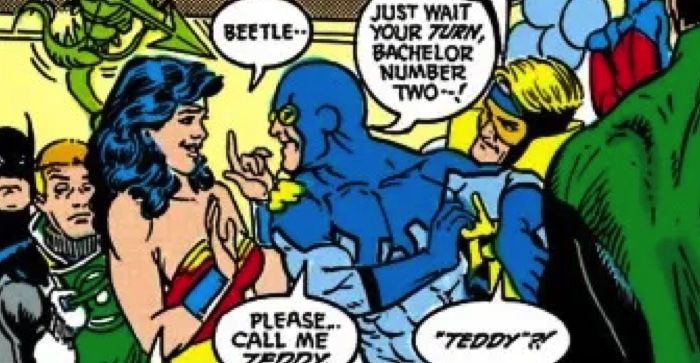
Wonder Women Get No Respect
This year marks the 80th anniversary of Wonder Woman’s debut. Despite her being one of the most powerful women in comics, the creators have never forgotten that she is a woman, and they treat her like one. I mean that in the worst way possible.
The idea of a female superhero is, on the surface, a subversive one. A woman who is stronger than most men? Who can save herself and even the whole world instead of depending on others for rescue? Sign me up! And yet, the (mostly male) creators — partially under duress from contemporary censors, to be completely fair — continued to rely on the old stereotypes. The preferred stereotypes shifted from decade to decade, but they all had the same effect of keeping even the most wondrous of women in her place.
Content warning: This article contains discussions and depictions of sexual harassment and old-timey misogyny. If you don’t want to see such content, might I recommend this article about comic book cinnamon rolls instead?
Did You Bring a Notepad?
The first team Wonder Woman joined was the Justice Society of America (temporarily though inconsistently rebranded as the Justice Battalion, because World War II). Wondy was elected as an honorary member at the end of the spectacularly racist All-Star Comics #11. But in the next issue, she volunteered to play secretary and to hold down the fort while the men go do stuff. Adding insult to injury, unlike the male honorary members (who haven’t even shown up yet!), Wonder Woman isn’t included on the team roll call until Issue 13, when she is promoted from honorary member to official secretary.
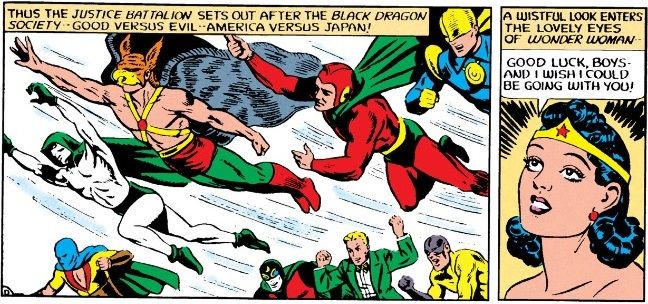
There’s nothing wrong with being a secretary, but I don’t think you’re making the best use of Wondy’s skillset here. Even after she started kicking butt with the rest of the Battalion, she still retained the “secretary” title, which strikes me as the equivalent of working moms being expected to cook, clean, and care for the kids after a day at the office while working dads get to put their feet up.
Give Me Your Hand (or Else)
Wonder Woman spent much of the ’60s being (sometimes literally!) pulled between two men: Steve Trevor, the pilot whose life she once saved, and Mer-man, a childhood friend of Diana’s. Steve and Mer-man made a habit of competing with each other, with the understanding that Wonder Woman would be forced to marry the winner. Did Wonder Woman agree to this nonsense? No. Do they go ahead with it anyway? Guess.
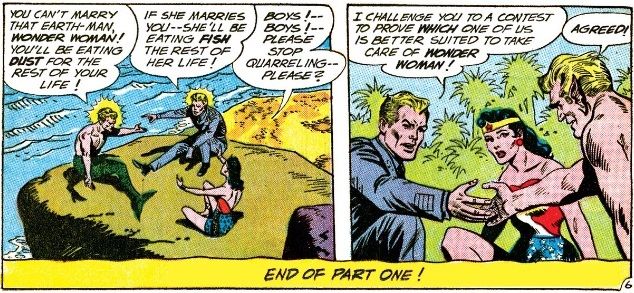
The audacity of thinking that either of them can “take care” of Wonder Woman. So adorable!
These panels are from Wonder Woman #125, which has the deeply unflattering and very telling title of “Wonder Woman — Battle Prize!” Even when Mer-man isn’t around, Steve continues to act like an entitled jerk, pushing for marriage even after Wonder Woman makes it clear that she is not ready for it.
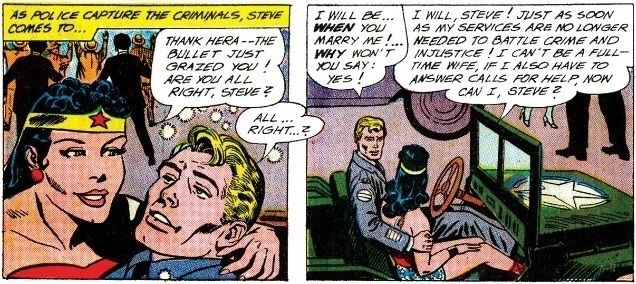
Immediately after this, Steve decides to stalk Diana to Paradise Island to find out if she has a secret boyfriend. He seems fun.
Justice Sleaze
Starting in the 1980s, superhero comics got progressively darker. As a sign of their newfound “maturity,” female characters — including Wonder Woman — were subjected to a new indignity: sexual harassment perpetrated by their colleagues and alleged friends. You could certainly find examples of this happening earlier (see: Stalker Steve), but it became especially widespread during this period. Everyone was creeping on their unwilling female teammates, from Green Lantern…
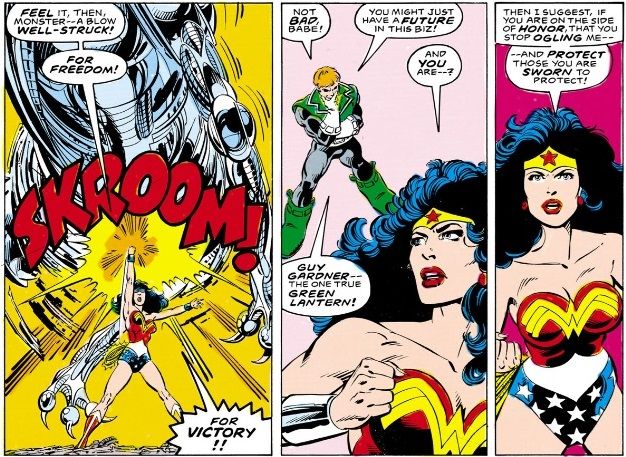
…to Blue Beetle…
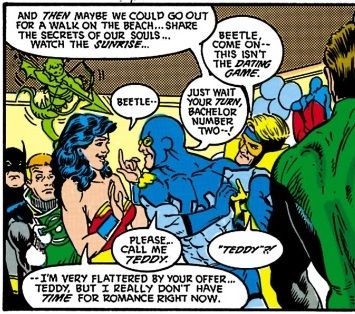
…to the Flash…
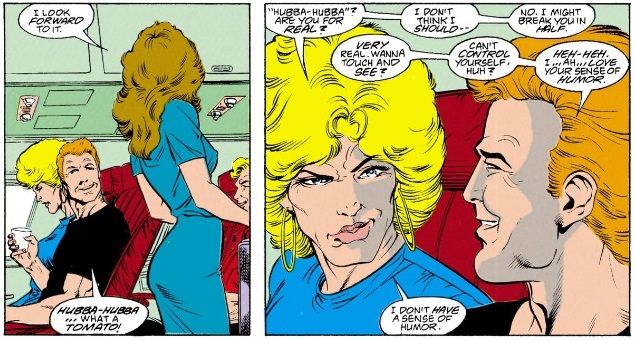
…and even to teenage Beast Boy.
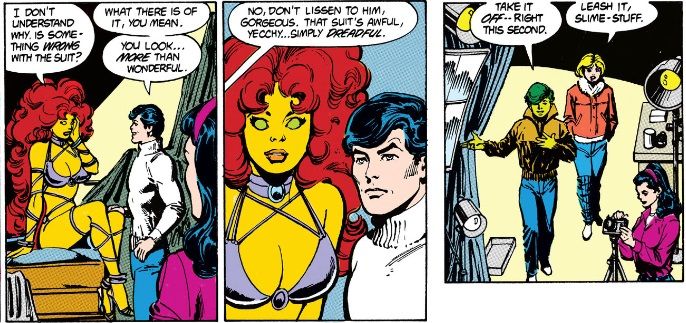
Basically, if you were even slightly inclined towards being comedy relief, harassment became part of your repertoire. Most of the time, Wonder Woman and the other female heroes brushed it off or, at best, made halfhearted threats they never followed through on, no matter how many times it happened. This further implied that the men’s behavior was no big deal and that it was okay for readers to laugh.
We’re Not Gonna Take It Anymore
In the post-#MeToo era, I should hope we are all well aware that none of the behavior I’ve discussed in this article — from automatically treating women like underlings to trying to force a woman to marry you, straight on through to making lewd remarks in the workplace — is not okay. But what bothers me most about all of this is Wonder Woman’s reaction — or lack thereof.
Diana is a diplomat; she is trained in the art of dealing with delicate situations and achieving favorable outcomes. Failing that, she has super strength and a wide range of tools (her lasso, her razor-sharp tiara) to fight — or at least threaten — her way to victory. In theory, she should have the standing and the strength (both physical and mental) to stand up for herself. And yet, despite the fact that she was created explicitly to show off female power, she doesn’t. Why? Why can’t this idealized version of womanhood, of all people, do what women everywhere have wanted to do for centuries and take men to task for their awful behavior?
Honestly, I think that’s the problem. Wonder Woman is the ideal woman…as envisioned by men. She is prettier, stronger, faster, and smarter than mortal women, but she also happily supports men in their endeavors however she can, secretly enjoys men’s advances even when she claims not to, and is flattered by (or at least tolerant of) even the crassest “compliments.”
Thankfully for my morale, there are examples of superheroines using their powers to stop creeps in their tracks. Check out Power Girl #4, in which Power Girl (the one with no sense of humor in the scan above) gives the cast of The Big Bang Theory what-for. She’s being playful, but it’s clear that she absolutely would have shoved Howard’s head in a popcorn bucket if he hadn’t shut up.
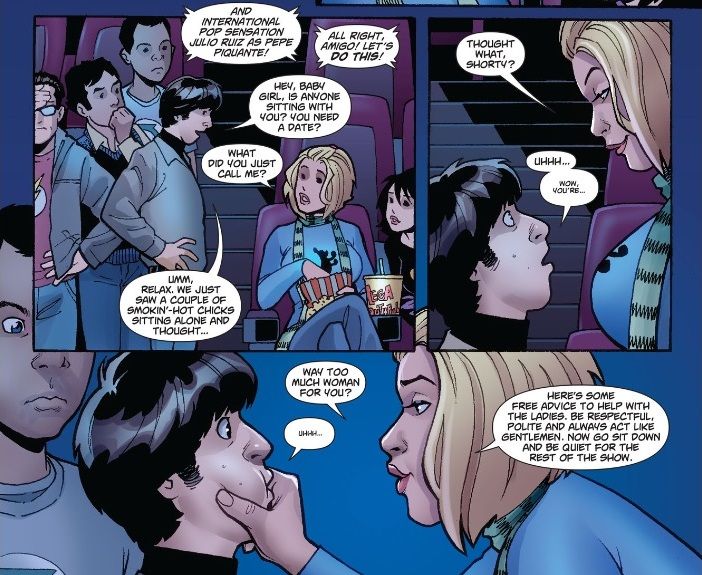
While this is most gratifying, in conjunction with all of the other examples I’ve mentioned, it takes on some unfortunate subtext: if a stranger hits on a woman, it’s creepy, but if her friend does it, well, boys will be boys!
I admit that I’m not as well-versed in more recent comics (Power Girl #4 is from 2009), so I couldn’t tell you how or if the situation has improved in the past decade. But it’s pretty obvious that they have a lot to make up for. The sooner they get started, the better.













